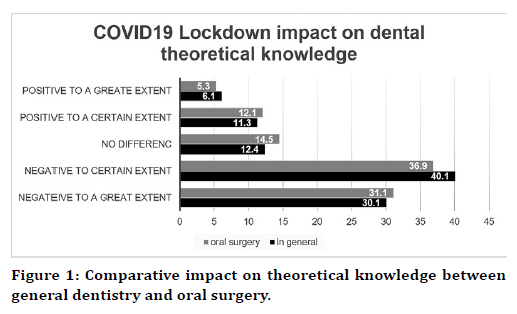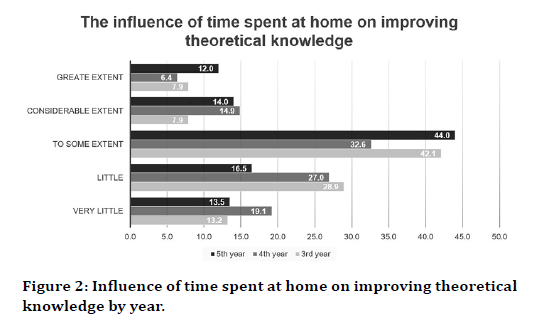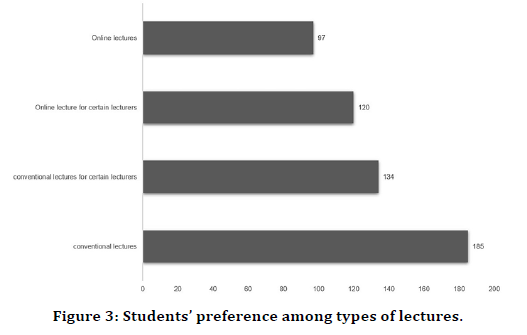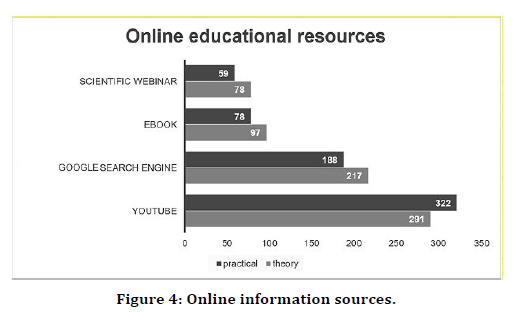Research - (2021) Volume 9, Issue 4
Oral Surgery Learning Outcome during Covid-19 Lockdown A Student-Based Evaluation
Faaiz Alhamdani1*, Atheer Talib2 and Mustafa Rashad3
*Correspondence: Faaiz Alhamdani, College of Dentistry, IbnSina University of Medical and Pharmaceutical Sciences, Iraq, Email:
Abstract
Purpose: This study aims to determine the influence of COVID19 Lockdown on the learning outcome for oral surgery subject from students’ perspective
Study design: a cross-sectional study
Methods: Three hundred and seventy-nine students from 3 dental schools in Iraq were approached by the researchers. They were asked to answer a specifically designed questionnaire for the study.
Results: Mann-Whitney U Test showed no significant difference (p>0.05) between the negative influence of the lockdown on general dental and oral surgical knowledge. The same test, however, showed a highly significant difference between the influence of COVID19 on oral surgery theory and oral surgery practice (p<0.001). Fifth-year students showed more benefit of time compared to 4th and 3rd-year students. YouTube was the main source of information in both theory and practice (around 77%, and 85% respectively).
Conclusion: oral surgery lost its peculiarity among other dental subjects due to COVID19 lockdown. This lockdown, also, appear to have negative influence on students’ control of time. YouTube was an important educational source for in oral surgery.
Keywords
Oral surgery, Online-education, Students’ evaluation
Introduction
Oral surgery education is a challenging task for both educators and students. It involves both cognitive and practical skills development. Hence, students endure a stressful clinical training environment with a multiplicity of required tasks to achieve their learning objectives [1,2].The COVID19 virus pandemic added new aspects to this challenge. The pandemic affected academic institutes worldwide [3,4], due to the long period of lockdown. It started in most of the countries in March 2020 [5] and continued with different levels of social restrictions according to the severity and the degree of spread. This lockdown interrupted the conventional faceto- face education process [6,7]. During this lockdown dental institutes were obliged to deliver the educational material using different educational techniques using online media [8- 10].
Transformation to online information exchange in undergraduate education is not a new subject [11]. It has been an issue of concern recently. There are, however, five issues to be addressed to ensure effective learning outcomes; change, pace, technology, competence, and finance [12].This transformation has its bearings on the level of learning by dental students in both clinical and non-clinical sciences, oral surgery is no exception. Dental institutes, however, considered their available alternative educational options based on the administrative, and an academic point of view [5,13,14]. To the best of the authors’ knowledge, a limited number of studies considered undergraduate students’ feedback toward online dental education [15]. This study aims to determine the influence of COVID19 Lockdown on the learning outcome for oral surgery subject from students’ perspective.
Materials and Methods
The study has been ethically approved by the IRB, IbnSina University of Medical and Pharmaceutical Sciences, Iraq. Third, fourth, and fifth years students from 3 Iraqi dental schools were approached by the research team. They were asked to answer a specifically designed questionnaire for the study. The questionnaire link was delivered electronically as a google form. These students were 2019-2020 academic year students.
Descriptive and analytical statistics were applied to analyze the study findings. SPSS Ver.25 was used for the analysis. A P-value less than 0.05 were considered the level for the statistical significance.
Results
Three hundred and seventy-nine students participated in the study. Two hundred and forty participants (63.3%) were females, whereas 139 (36.7%) were males. Statistical analysis did not show any significant relationship between students’ gender and the educational method preference, online information sources, or the usefulness of time spent at home on the gained theoretical knowledge.
About 70% of students reported a negative influence of the lockdown on their general dental, and oral surgical theoretical knowledge (Figure 1), Mann-Whitney U test showed no significant difference (p>0.05) between the influence of the lockdown on general dental and oral surgical knowledge in both theoretical and practical aspects. As expected, the test showed a highly significant difference (p<0.001) between the influence of the lockdown on theoretical and practical knowledge in oral surgery.

Figure 1. Comparative impact on theoretical knowledge between general dentistry and oral surgery.
The number of fifth-year students was 200 (52.8%) participants, followed by 141 4th year students (37.2%). Third-year participants were 38 students (10%). Figure 2 demonstrates the influence of time on knowledge improvement. Seventy percent of 5th stage students showed a higher level of benefit compared to the 3rd and 4th stage students (around 57.9% and 53.9%) respectively. Spearman’s correlation analysis showed a highly significant relationship between the students’ stage (year) and the benefit from time spent at home on oral surgery theoretical knowledge level (p<0.001). The same test showed a significant (p<0.03) relationship between the influence of COVID19 lockdown on oral surgery practical knowledge and students’ stage (year).

Figure 2. Influence of time spent at home on improving theoretical knowledge by year.
Approximately, half of the respondents preferred conventional lectures (Figure 3). This was followed by a preference for conventional lectures for certain lecturers. On the other hand, online lectures were the preferable mode by a third of the students. If both “online lectures”, and “online lectures for certain lecturers” categories are considered, 57.2% of respondents were interested in online education.

Figure 3. Students’ preference among types of lectures.
Figure 4 shows that YouTube was the main additional online information source of both theoretical and practical knowledge in oral surgery (around 77%, and 85% respectively), followed by the google search engine (about 57% and 49.6% respectively). Scientific webinars were the least reported online information source (about 20.5% and 15.5% respectively). Apart from YouTube, the number of students who used additional information sources to improve their theoretical knowledge was slightly higher than their use to improve their practical knowledge.

Figure 4. Online information sources.
Discussion
This study tries to focus on different aspects of students’ attitudes toward conventional and online oral surgery education. It also tries to illuminate the learning behaviour during the COVID19 lockdown period.It does not aim to address the educational challenges, from an administrative perspective during the lockdown in general. Other studies have highlighted this aspect of the impact of COVID19 on undergraduate education [4].
Interestingly, there was no obvious difference, from students’ perspective, between general dental and oral surgical knowledge during the lockdown period. This might refer to the fact that online education levels the ground among all dentistry subjects. In another word, there are no specifications that identify each subject. It is supposed that each dental subject has a specific influence on different students. Online learning, however, does not seem to support this assumption.
The absence of difference between student’s preference toward specific online information sources in both theory and practice might further solidify the notion that e-learning tools could have a similar influence on different aspects of the educational process.
It is obvious, as the study data showed, that the Coronavirus pandemic had a negative influence on the level of both theoretical and practical clinical aspects in oral surgery. This is expected in terms of educational program delivery and the lack of proper assessment [13], but this does not justify the level of negative influence on theoretical knowledge. Online education can provide useful theoretical information with its engaging audio-visual tools [10]. It is expected, however, to see the differences between the lockdown influence on theory and practice in oral surgery. Direct involvement in manual surgical work can be considered the main reason behind the importance conventional surgical practice [10].
It seems that students did not use the time spent at home most effectively. This could indicate poor time management by the students. However, the feeling of uncertainty associated with the COVID19 outbreak with unpredictability toward its influence, quarantine period, and loss of lives might have some influence [6]. Needless to mention, related boredom, anxiety, and frustration [4].
The influence of time, however, seems to differ in its influence in the case of 5th stage students who appear to benefit from time better than 3rd and 4th-year students. This might be related to the importance of this year for students as a graduation year. There is, as the study shows, an overlap between the students’ choices among conventional and online lectures. Some students prefer conventional lectures besides online lectures for certain lecturers. Others prefer online lectures with conventional lectures for certain lecturers. This overlapping might reflect that different lecturers differ in their ability to deliver the required information in both conventional and online methods. Besides, the level of preparation by both teachers and students for online education needs to be considered. The abrupt transformation from conventional to alternative online educational methods has not been easy for different reasons [4].
Direct interaction during the conventional lecture could be the main reason for students’ preference toward conventional lectures. It provides a better ability to focus on the given information. Schlenz, Schmidt, in their online survey, also found that dental students favour more face-to-face conventional education [15]. Education itself is a social process. Authors frequently cite John Dewey's quote “education is not a preparation for life but is life itself [16].
Knösel et al. have noticed an increase in the educational YouTube videos uploaded by the academic institution through their YouTube channels. This might explain the reliance of students on this social medium as a source for theoretical information in oral surgery [17]. Oral surgery by itself is a clinical science. Accordingly, YouTube videos through their movie-based commentary method could provide a useful practical educational experience [11,18]. Hence, Academic institutions can optimize the use of such influential social media to provide academic materials [6]. In this way, the academic institute can control the nature of the required information and avoid any distraction that might be caused by different sources of uncensored biased scientific information.
The use of the Google search engine as the second most common online information source might be explained by its function. Google search provides wide options for search, in terms of documents, online reports, images, and videos.It seems that scientific webinars and e-books are not strongly engaging materials for most of the students from the students’ perspective, cannot be relied on as sole information providers.
Conclusion
In Conclusion, oral surgery lost its peculiarity among other dental subjects due to COVID19 lockdown. This lockdown, also, appear to have negative influence on students’ control of time. YouTube was an important educational source for in oral surgery.
Conflict of Interest
The authorsdeclaire that there is no conflict of interest in regard to this research.
References
- Faaiz Alhamdani B. Dental students’ views of their clinical cognitive skills. A qualitative study. J Oral Dent Res 2017; 23:1-3.
- Morse Z, Dravo U. Stress levels of dental students at the Fiji school of medicine. Eur J Dent Educ 2007; 11:99-103.
- Mishra L, Gupta T, Shree A. Online teaching-learning in higher education during lockdown period of COVID-19 pandemic. Int J Educ Res 2020; 1:100012.
- Aristovnik A, Keržiˇc D, Ravšelj D, et al. Impacts of the COVID-19 pandemic on life of higher education students. Sustainability 2020; 12.
- Quinn B, Field J, Gorter R, et al. COVID-19: The immediate response of european academic dental institutions and future implications for dental education. Eur J Dent Educ 2020; 24:811-814.
- Machado RA, Bonan PRF, Perez DEDC, et al. COVID-19 pandemic and the impact on dental education: discussing current and future perspectives. Braz Oral Res 2020; :1-6.
- Adedoyin OB, Soykan E. Covid-19 pandemic and online learning: the challenges and opportunities. Interact Learn Envir 2020; 1-13.
- Chang TY, Hong G, Paganelli C, et al. Innovation of dental education during COVID-19 pandemic. J Dent Sci 2021; 16:15-20.
- Chavarría-Bolaños D, Gómez-Fernández A, Dittel-Jiménez C, et al. E-learning in dental schools in the times of COVID-19: A review and analysis of an educational resource in times of the COVID-19 pandemic. Odovtos Int J Dent Sci 2020; 22:69-86.
- Sharka R. Can undergraduate dental education beonline and virtual during the COVID-19 era? Clinical training as a crucial element of practical competencies. Med Ed Publish 2020; 9:11-16.
- Buzzetto-More NA. Social networking in undergraduate education. Interdiscip J Inform Knowledge Manag 2012; 7.
- Kopp M, Gröblinger O, Adams S, Five common assumptions that prevent digital transformation at higher education institutions. Proceedings of INTED Conference Valencia, Spain 2019.
- Gaudin A, Arbab-Chirani R, Pérez F. Effect of COVID-19 on dental education and practice in france. Front Dent Med 2020; 1.
- Liu X, Zhou J, Chen L, et al. Impact of COVID-19 epidemic on live online dental continuing education. Eur J Dent Educ 2020; 24:786-789.
- Schlenz MA, Schmidt A, Wöstmann B, et al. Students’ and lecturers’ perspective on the implementation of online learning in dental education due to SARS-CoV-2 (COVID-19): A cross-sectional study. BMC Med Educ 2020; 20:354.
- Gwyer J, Hack L. Education is a social process. J Physical Therapy Educ 2012; 26:3.
- Knösel M, Jung K, Bleckmann A. YouTube, dentistry, and dental education. J Dent Educ 2011; 75:1558-1568.
- DeWitt D, Alias N, Siraj S, et al. The potential of Youtube for teaching and learning in the performing arts. Social Behav Sci 2013; 1118 – 1126.
Author Info
Faaiz Alhamdani1*, Atheer Talib2 and Mustafa Rashad3
1College of Dentistry, IbnSina University of Medical and Pharmaceutical Sciences, Baghdad, Iraq2Department of Oral and Maxillofacial Surgery, College of Dentistry, Mustansiria University, Baghdad, Iraq
3Department of Dentistry Department, Dijlah University College, Baghdad, Iran, Islamic Republic of
Citation: FaaizAlhamdani, AtheerTalib, Mustafa Rashad, Oral Surgery Learning Outcome during Covid-19 Lockdown A Student-Based Evaluation, J Res Med Dent Sci, 2021, 9 (4): 307-311.
Received: 17-Mar-2021 Accepted: 06-Apr-2021
